Cooperation Comes from Shared Technologies | Sino-Singapore Summit for Digital Economy and Artificial Intelligence Successfully Held
On November 20, 2020, the "Sino-Singapore Summit for Digital Economy and Artificial Intelligence" was initiated online. The summit was sponsored by China Association for Science and Technology (CAST) and organized by China Centre for International Science and Technology Exchange, Chinese Association for Artificial Intelligence (CAAI) and Business China, Singapore. Over 610,000 attendees participated in the summit. 2020 marks the 30th anniversary of the establishment of diplomatic ties between China and Singapore. On this occasion, the summit was held as a bridge for scientists from China and Singapore to better communicate. Guided by the idea of using science and technology to make people's life easier and using data for the good of people, the summit aims to enhance well-being of people of two countries.
Expand common understanding and strengthen in-depth cooperation between China and Singapore in the field of science and technology
Yang LIU, Director of International Liaison Department of CAST, remarked that he hopes experts could take this opportunity to exchange ideas on digital economy development, and intelligent technology innovation. He also wished a consensus to be enhanced and in-depth cooperation between the two countries in the field of digital economy and artificial intelligence to be strengthened. CAST is willing to join in hands with Singapore sci-tech organizations to explore new channels and models of cooperation in sci-tech innovation. Joint efforts should be made to promote scientific and economic development of both countries, LIU said.
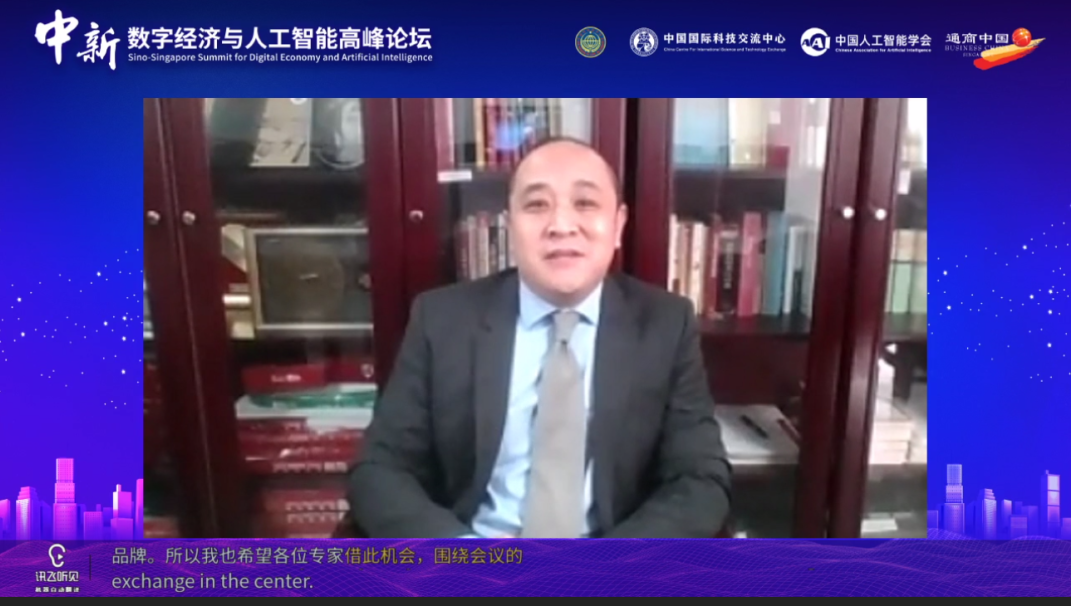
Yang LIU
Academician Qionghai DAI, Counselor of the State Council of the People's Republic of China and President of CAAI, pointed out in his speech that the development of China and Singapore shares much similarity. As 2020 is the 30th anniversary of the establishment of diplomatic relations between China and Singapore, this summit is of great strategic value to deepen win-win cooperation between the two countries in digital economy and artificial intelligence.
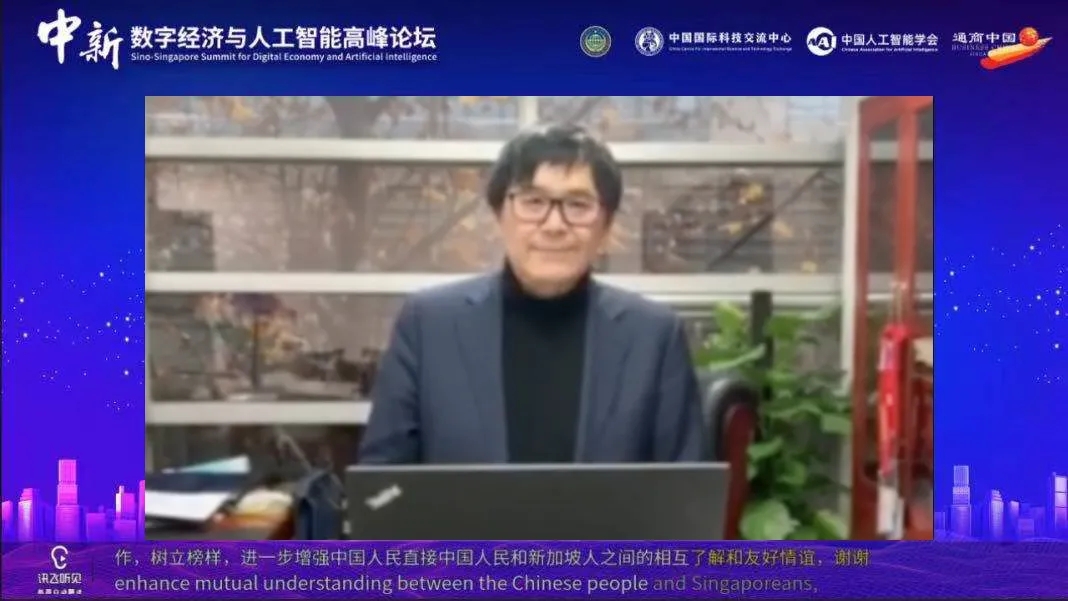
Qionghai DAI
TIN Pei Ling, CEO of Business China, said that in the future, Business China will take the forum as an opportunity to work with CAAI. Through technology exchange, project incubation, industrial collaboration and other approaches, cooperation in the field of artificial intelligence and digital economy will be made to promote industrial upgrading and technological innovation.
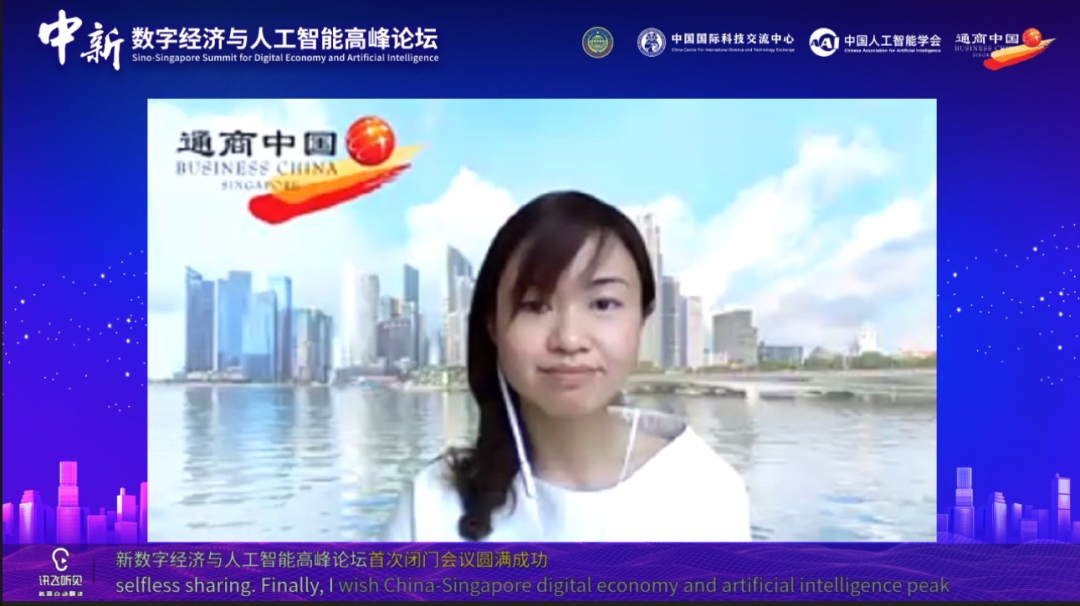
TIN Pei Ling
The forum was co-moderated by Associate Chair Professor Bo AN from President's Council of School of Computer Science and Engineering, Nanyang Technological University (NTU) and Professor Lihua ZHANG, Director of CAAI Technical Committee on Human-Machine Intelligence and Executive Vice President of Academy for Intelligent Robots, Fudan University.

Bo AN(Left) and Lihua ZHANG (Right)
4 Objectives and 13 Speeches Mapped out a Blueprint of Development
Thirteen Chinese and Singaporean scientists and entrepreneurs from the field of digital economy and artificial intelligence gave their lectures. Four major objectives were set in the summit: "Artificial Intelligence and Brain Health," "Natural Language Processing and Brain-Computer Interfaces," "Information Learning Perception and Cognition," and "Intelligent Robots 2020-2035: Extensive and In-Depth Exploration". Centered on the objectives above, our speakers stroke high-quality academic and intellectual resonance across borders, cultures and fields. They also provided two countries with professional guidelines for the development of intelligent technology and digital industry in post-pandemic era.
In "Artificial Intelligence and Brain Health" session, Professor Tianzi JIANG from the Institute of Automation of Chinese Academy of Sciences, introduced how to use artificial intelligence to address challenges of brain health. Associate Professor Anqi QIU, Associate Dean of the Department of Biomedical Engineering, National University of Singapore, emphasized the impact of brain images and genetic data on aging, dementia, and other aspects of brain health.

Tianzi JIANG (Left) and Anqi QIU (Right)
In "Natural Language Processing and Brain-Computer Interfaces" session, four speakers shared their inspirational ideas. These speakers are: Cuntai GUAN, Dean of Institute of Artificial Intelligence, Nanyang Technological University; Xiaoyan ZHU, Director of State Key Laboratory of Intelligent Technology and Systems, Tsinghua University; Weisi LIN, Associate Dean of School of Computer Science and Engineering, Nanyang Technological University, and Professor Gao CONG from the School of Computer Science and Engineering, Nanyang Technological University. Excellent presentations were made around following topics: 'research and application of artificial intelligence and brain-machine interface in brain health', 'current status and outlook of dialog systems', 'visual collaborative intelligence and its commercial prospects' and 'spatial data management and mining and its application in intelligent cities'.
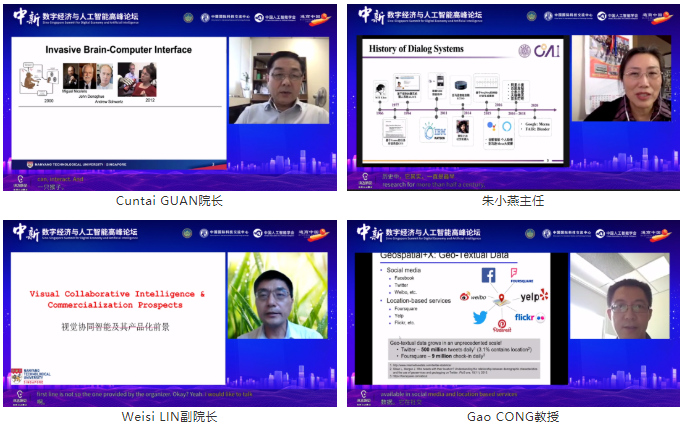
Cuntai GUAN, Xiaoyan ZHU, Weisi LIN and Gao CONG
In "Information Learning Perception and Cognition" session, Professor Tat-Seng CHUA from the School of Computing, National University of Singapore, analyzed the deep semantic understanding of videos. Professor Licheng JIAO, former vice president of CAAI and dean of the School of Artificial Intelligence, Xidian University, introduced some challenges and ideas of current quantum learning perception and optimization. Shengmei SHEN, Chief Scientist and President of Singapore Academy of The Paper Co., Ltd., highlighted the important role of AI-driven digital economy upgrading in building Singapore's "Intelligent Nation".

Tat-Seng CHUA (Left), Licheng JIAO (Middle) and Shengmei SHEN (Right)
In the session of "Intelligent Robots 2020-2035: Extensive and In-Depth Exploration", ShuzhiSam GE, Academician of National University of Singapore and Professor of Singapore Academy of Engineering, gave a speech of “Spiral Evolution of AI and Robotics in the Digital Economy”. Hong LIU, Professor of Peking University and Vice President of CAAI, introduced new generation AI and public service robots. Xiaoping CHEN, Director of the Robotics Laboratory, University of Science and Technology of China, gave detailed analysis on opportunities and challenges that AI robots might face in 2020-2035. Associate Chair Professor Bo AN from President's Council of School of Computer Science and Engineering, demonstrated the latest progress and trend in distributed artificial intelligence.
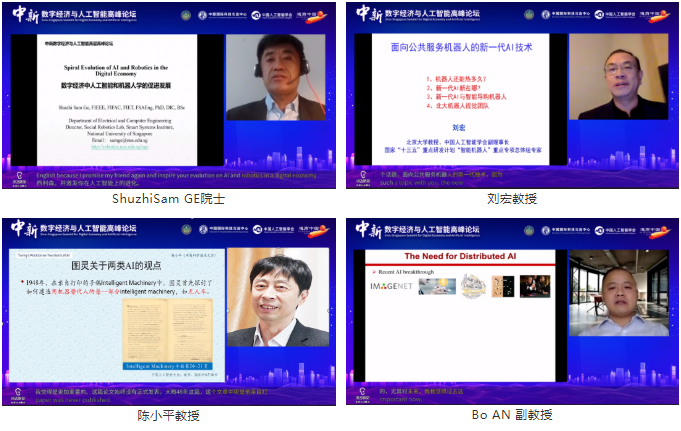
ShuzhiSam GE, Hong LIU, Xiaoping CHEN and Bo AN
Empower Technology Innovation to Benefit Two Peoples
Establish communication channels and long-term exchange mechanisms between Chinese and Singapore scientific communities. CAAI, with the help of CAST's "Building World-Class Society" project, co-organized this summit with many other associations. Throughout the session, CAAI received tremendous help from Institute of Automation of Chinese Academy of Sciences, National University of Singapore, Nanyang Technological University, Xidian University, University of Science and Technology of China, Jiangsu Nanjing Eco-Tech Island Economic, Sino-Singapore Nanjing Eco Hi-Tech Island Development Co., Ltd., Linguistic Intelligence & Knowledge Engineering Research - Nanjing, China, IFLYTEK Co., Ltd. The summit made digital economy and artificial intelligence as footholds and took an important first step towards the establishment of "China-Singapore AI Dialogue Mechanism".
Last of all, Professor Tianzi JIANG, in his concluding remark, expressed his gratitude to CSTA for building a bridge between Chinese and Singaporean AI experts and to the experts who gave excellent lectures. He wished Sino-Singaporean sci-tech dialogues to continue, the influence to be enhanced, the benefits to be expanded, and the value to be magnified. It is our goal to make blueprints come true, as the blueprints will in turn empower sci-tech innovation in both countries and eventually benefit two peoples, he said.
- Government
- Association




